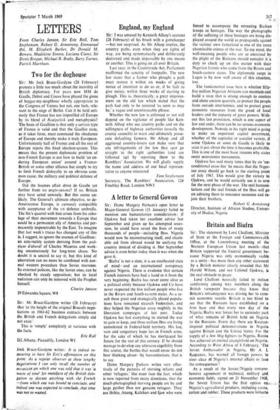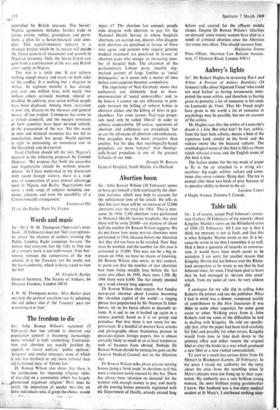Britain and Biafra
Sir: The statement by Lord Chalfont, Minister of State at the Foreign and Commonwealth Office, at the Luxembourg meeting of the Western European Union last month—that Britain supported the Federal government be- cause Nigeria was only economically viable as a unity—has more than any other statement by a British minister clearly revealed that Mr Harold Wilson, and not Colonel Ojukwu, is the real obstacle to peace.
Lord Chalfont naturally failed to induce conformity among WEU members along the British viewpoint because they know that Britain's intransigence was driving her to com- mit economic suicide. Britain is too blind to see that the Russians have established on a firm base and that every new day of the Nigeria/Biafra war forces her to surrender part of what remains of British hold on Nigeria to the Russians. Every day there are Russian- inspired political demonstrations in Nigeria against Britain and the United States. For the supply of a few Mig fighters to Nigeria, Russia has achieved an eternal stranglehold on Nigeria. According to West Africa of 8 February, 'The Soviet Ambassador in Nigeria, Mr A. L Romanov, has warneil all foreign powers to steer clear Of Nigeria's internal affairs or face the consequences'!
As a result of the Soviet/Nigeria compre- hensive agreement in technical, military and economic fields, signed on 21 November 1968, the Soviet Union has the first option on4-:....a; Nigeria's agricultural products, including cocoa, cotton and rubber. These products were hitherto controlled by British interests. The Soviet/ Nigeria agreement includes, besides trade in cocoa, cotton, rubber, groundnuts and petro- leum, a plan for a Soviet-financed steel com- plex. This capital-intensive industry is a strategic project which by its nature will decide-- the future pattern of investment and growth in Nigerian economy. Only the Soviet Union can gain from a continuation of the war and British arms supply to Nigeria.
This war is a futile one. It can achieve nothing except misery and waste on both sides of the conflict. It is nothing but a disgrace to . Africa. In eighteen months it has already cost over one million lives, with nearly two million others seriously maimed, injured or disabled. In addition, over seven million people have been displaced. Among them, starvation is now rife, disease on the increase and general misery all too evident. Commerce has come to a virtual standstill, and the meagre resources of both countries have been devoted entirely to the prosecution of the war. Yet this waste in men and material resources has not led to conciliation, much less peace. World opinion is right in demanding an immediate end to the bloodshed and destruction.
Lord Chalfont should tell the WEU Nigeria's reaction to the following proposals by Colonel Ojukwu : 'We propose that both the cease-fire and negotiations -should be without precon- ditions. As I have mentioned in my discussion with recent foreign visitors, there is a wide area of cooperation of great mutual advantasa open to Nigeria and Biafra. Negotiations can cover a wide range of subjects including eco- nomic relations and even the possibility of a Commonwealth arrangement.'
EIJI mature! Oti 33 rue des Ecoles, Paris Ve, France



































 Previous page
Previous page